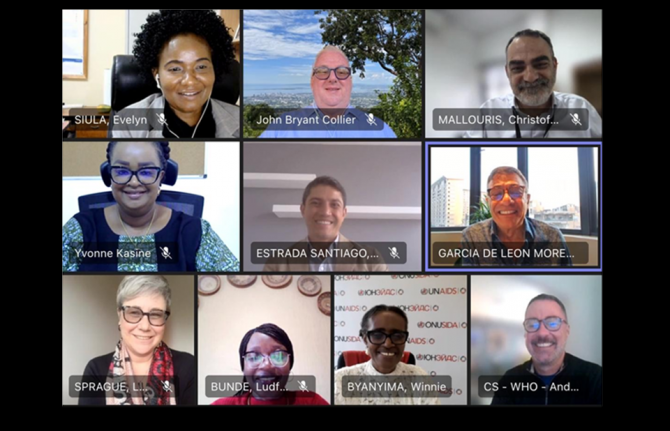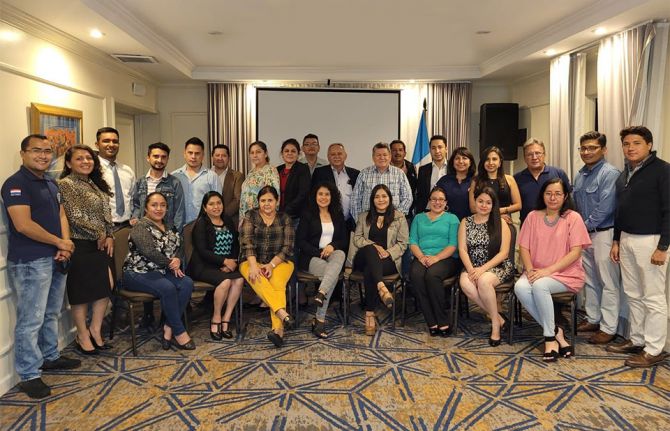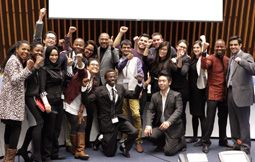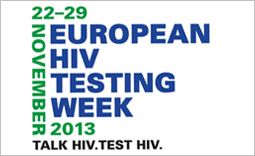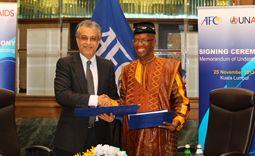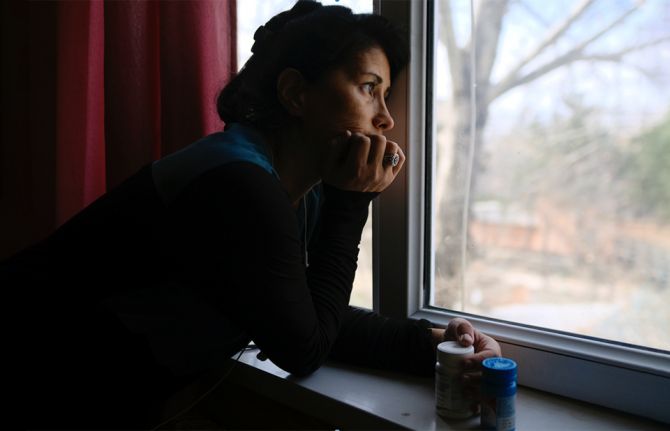
Feature Story
ILO workplace partners' forum tackles HIV with high level support
17 July 2010
17 July 2010 17 July 2010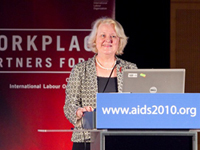 UNAIDS Deputy Executive Director, Management and External Relations Ms Jan Beagle. Credit: UNAIDS Anna Rauchenberger
UNAIDS Deputy Executive Director, Management and External Relations Ms Jan Beagle. Credit: UNAIDS Anna RauchenbergerThe recent adoption of a ground-breaking human rights instrument on HIV and the world of work has brought the key role of the workplace in the global AIDS response into sharp focus.
On 17 July, the eve of the XVIII International AIDS Conference, the International Labour Organization (ILO) convened a workplace partners’ forum to explore how best to achieve greater coordination and harmonization in taking a rights-based approach to address HIV in the world of work.
Attracting high-level participation, the forum brought together delegates from UNAIDS and its ten cosponsors, HIV workplace implementers, workers, employers, donors and networks of people living with HIV. Speakers included the Honourable Rudolf Hundstorfer, Austrian Federal Minister of Labour, Social Affairs and Consumer Protection; Mr Patrick Obath, Chairperson of the Federation of Kenya Employers; and Ms Jan Eastman, Chairperson of the Global Union AIDS Programme.
UNAIDS Deputy Executive Director, Management and External Relations Brand, Ms Jan Beagle also gave a keynote address along with Dr Sophia Kisting, Director of the ILO Programme on HIV/AIDS and the world of work.
Ms Beagle highlighted the important role of the workplace in providing universal access to prevention, care and support saying “the workplace provides unique entry points to reaching people where they spend the most amount of time in their daily lives.”
“We are all aware that HIV affects the most economically active age range in every population and the majority of the 33.4 million people estimated to be living with HIV worldwide are workers. Many are still subject to stigma and discrimination and the threat, or reality, of losing their jobs due to their status,” Ms Beagle continued.
The forum catalysed action in the development and implementation of country-level interventions and promoted greater engagement of the private sector and business in HIV programming. It was an opportunity to share ideas and experiences with a view towards establishing a global partnership network that will be of special benefit during the implementation phase of the new standard, which is the first international labour standard to concentrate on HIV.
Labour standard on HIV in the world of work
Formulated with the aim of enhancing the contribution of the world of work to attaining universal access to HIV prevention, treatment, care and support services, the recently adopted labour standard also contains provisions for anti-discrimination measures at all levels and stresses the importance of confidentiality and employment and income generation for people living with HIV. It is also intended to protect workers against unfair dismissal due to actual or perceived HIV status and mandatory HIV testing.
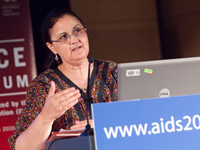 Dr Sophia Kisting, Director of the ILO Programme on HIV/AIDS and the world of work. Credit: UNAIDS/Anna Rauchenberger
Dr Sophia Kisting, Director of the ILO Programme on HIV/AIDS and the world of work. Credit: UNAIDS/Anna Rauchenberger Commenting on the event, Dr Kisting said, “This forum should allow us to generate creative ideas on how we can optimise the implementation of the Recommendation. Our success will be determined by our collective resolve to deliver."
Responding effectively to HIV in the workplace is seen as essential to the development of national HIV strategies and forms part of a wider spectrum including health, education and social protection. According to the ILO, workers should be central in the design, implementation and evaluation of workplace programmes which are to be developed through widespread consultations with governments, employers and people living with HIV.
Right Hand Content


Cosponsors:
Partners:
Austrian Federal Ministry of Labour, Social Affairs and Consumer Protection
Federation of Kenya Employers
Global Union AIDS Programme
Speeches:
Speech by UNAIDS Deputy Executive Director, Management and External Relations Brand, Ms Jan Beagle (17 July 2010)
Feature stories:
Ground-breaking labour instrument to address HIV in the world of work (08 June 2010)
International Labour Conference tackles HIV in the world of work (03 june 2009)
International labour standard would strengthen the HIV response in the workplace (21 July 2008)
Publications:
UNAIDS Outlook Report 2010 (pdf, 6 Mb)
UNAIDS Outcome Framework 2009-2011 (pdf, 388 Kb)

Feature Story
18th International AIDS Conference to open in Vienna
16 July 2010
16 July 2010 16 July 2010
The XVIII International AIDS Conference (AIDS 2010) will begin in Vienna on 18 July. A pivotal year in the AIDS response, it will coincide with a major push for expanded access to HIV prevention, treatment, care and support as 2010 is the target year set by countries to achieve universal access to HIV services and comes ten years after nations committed to the historic Millennium Development Goals.
With the international financial downturn and bleak global economic outlook threatening to undermine public investments, the event hopes to help keep HIV on the front burner, and is a chance to demonstrate the importance of continued HIV investments to broader health and development goals.
“Rights Here, Right Now”
The overarching theme of AIDS 2010 is "Rights Here, Right Now". It highlights that the protection of human rights is a fundamental prerequisite to an effective response to HIV—whether directly involving people living with HIV or particular groups, such as women and girls, men who have sex with men, people who use drugs, sex workers or young people.
AIDS 2010 will provide a multidisciplinary forum for networking and the sharing of information related to new research and evidence-based programmes and policies. It is a chance for the many stakeholders involved in HIV to take stock of where the epidemic is, evaluate recent scientific developments and lessons learnt, and collectively chart a course forward.
HIV epidemics in Eastern Europe and Central Asia
Taking place in Vienna, AIDS 2010 will turn attention towards the growing epidemics in Eastern Europe and Central Asia where an estimated 1.5 million people were living with HIV in 2008, a rise of 66% from 2001. HIV prevalence in the region is also on the rise, with severe and growing epidemics in the Ukraine and the Russian Federation.
One of the highlights of the AIDS response in the region is the high coverage of services to prevent mother-to-child HIV transmission. In December 2008, coverage of services to prevent mother-to-child transmission exceeded 90% in Eastern Europe and Central Asia.
However reaching many of people at higher risk of HIV remains a challenge. Injecting drug use is the main mode of HIV transmission in this region. An estimated 3.7 million people inject drugs, and roughly one in four are thought to be HIV-positive. Evidence suggests that injecting drug users in the region, are often the least likely to receive antiretroviral therapy.
Preventing sexual transmission of HIV prevention will also be high on the conferences agenda. With increasing transmission among the sexual partners of drug users, many countries in the region are also experiencing a transition from an epidemic concentrated among injecting drug users to one that is increasingly characterized by significant sexual transmission.
UNAIDS at Vienna
UNAIDS will be publishing live updates from the conference. UNAIDS @ Vienna blog, on twitter and facebook. During the upcoming week interviews with activists and conference goers on their perspectives of the conference and the AIDS response will also be posted on YouTube.
Vienna partners
The conference takes place every two years and is the largest gathering for those who work in the AIDS response including policymakers, people living with HIV and civil society.
Local and regional partners include the host the City of Vienna, the Government of Austria, Austrian AIDS Society, Aids Hilfe Wien, East Europe & Central Asia Union of PLHIV, European AIDS Clinical Society and the European Commission.
International partners include UNAIDS and its Cosponsors, WHO and the United Nations Office on Drugs and Crime; the International Council of AIDS Service Organizations; the Global Network of People Living with HIV/AIDS; the International Community of Women Living with HIV/AIDS; the World Young Women’s Christian Association; and the Caribbean Vulnerable Communities Coalition.
Right Hand Content
Related

Feature Story
Join UNAIDS and IAS at Town Hall on reshaping the future of AIDS
16 July 2010
16 July 2010 16 July 2010
Towards a paradigm shift in HIV treatment and prevention
At this defining moment—reshaping the AIDS response is a necessity. Join UNAIDS and the International AIDS Society to set the tone for the AIDS 2010 Conference: challenging and encouraging delegates to call for and join a movement to reshape the AIDS response to reach universal access to HIV prevention, treatment, care and support.
Towards a paradigm shift in HIV treatment and prevention .
13.30 to 15.00 Sunday, 18 July 2010
Session Room 6
Guest speakers include Kgalema Motlanthe, Deputy President of South Africa; Julio Montaner, President of the International AIDS Society, and Michel Sidibé, Executive Director of UNAIDS.
Bring your ideas to this interactive Town Hall event and engage with leaders in the AIDS response. Panelists include: Rolake Odetoyinbo, Executive Director, Positive Action for Treatment Access, Mphu Ramatlapeng, Minister of Health and Social Welfare of Lesotho and Barbara Lee, US Congresswoman, 9th District of California.
Annie Lennox, long-time AIDS activist and UNAIDS International Goodwill Ambassador, will lend her unique voice to setting the tone for the Conference.
Hosted by James Chau, News Anchor, China Central Television; UNAIDS National Goodwill Ambassador for China.
To attend and promote the event on facebook, go to:
www.facebook.com/?ref=home#!/event.php?eid=110421382341713&ref=mf
Note to broadcasters: The Town Hall event will be offered to broadcasters rights-free. Please contact Saya Oka, okas@unaids.org
Right Hand Content


Publications:
UNAIDS Outlook Report 2010 (pdf, 6 Mb)
UNAIDS Outcome Framework 2009-2011 (pdf, 388 Kb)
Related

Feature Story
'Give AIDS the Red Card' web competition closes
14 July 2010
14 July 2010 14 July 2010With the ending of the 2010 FIFA World Cup in South Africa, the UNAIDS web contest has come to a close as well. Contestants joined the UNAIDS Goodwill Ambassadors footballers Michael Ballack and Emmanuel Adebayor in the ‘Give AIDS the Red Card’ web competition to learn about HIV and win prizes. The contest engaged hundreds of participants from all corners of the world. Respondents’ thoughtful ideas for a solution to stopping stigma and discrimination were particularly enlightening and promising.
The UNAIDS advocacy campaign, 'From Soweto to Rio de Janeiro, give AIDS the red card to prevent babies from becoming infected with HIV' is one of the initiatives towards ensuring a healthy and HIV-free generation of children.
Lucky winners will soon receive prizes and memorabilia, courtesy of Ballack, Adebayor and UNAIDS. UNAIDS would like to thank participants from all over the globe for their entries – we hope that you will continue to join us in working towards zero new HIV infections, zero discrimination and zero AIDS-related deaths!
Right Hand Content
Partners:
Michael Ballack
Emmanuel Adebyor
Press centre:
UNAIDS launches "red card" campaign against HIV (12 June 2010)
Feature stories:
UNAIDS Web Contest 2010 (15 June 2010)
Ahead of World Cup, national team captains appeal: “Give AIDS the red card” (07 June 2010)
Publications:
Related

Feature Story
European Parliament votes for rights-based AIDS response
14 July 2010
14 July 2010 14 July 2010 Catherine Ashton, Vice-President of the Commission/High Representative of the Union for Foreign Affairs and Security Policy.
Catherine Ashton, Vice-President of the Commission/High Representative of the Union for Foreign Affairs and Security Policy.In the lead up to the 2010 International AIDS Conference in Vienna, the European Parliament has voted on a Motion for a Resolution on a rights-based approach to the EU's response to HIV. Referring to the UNAIDS Outcome Framework 2009-2011, the Resolution strongly supports the Joint Programme's position on human rights issues such as decriminalization of sexual transmission, injecting drug users and on men who have sex with men.
Passed by an overwhelming majority of members on 8 July 2010, the Resolution also asks EU member states to meet their commitments as well as to step up efforts in addressing HIV as a global public health priority with human rights as central to its prevention, treatment, care and support, including in EU development cooperation. The XVIII International AIDS Conference which starts in Vienna on 18 July 2010 will run under the theme of human rights: ‘Rights Here, Right Now.’
Vice-President and High Representative of the European Union, Ms Catherine Ashton, made a strong statement to the Members of the Parliament in support of the Resolution: “I am confident that the Vienna Conference will help us to move forward in enforcing the rights of people to be protected against avoidable HIV infections and in gaining access to the evidence-based prevention and highly efficient treatment that so many honourable Members have referred to this evening.”
She also gave a personal commitment to ensure its effective implementation by the European Commission, saying, “I want to assure you as well that we will maintain and increase our dedication to defending these rights inside Europe, but also as part of our relations with third countries whether they are close to our borders or on other continents.
The Resolution calls on the European Commission and the Council to promote efforts to decriminalise HIV transmission and exposure and to support harm reduction programmes for prisoners and injecting drug users.
Recognizing that addressing women’s needs was an essential measure for curbing the epidemic, the Resolution also calls for expanding access to sexual and reproductive health care programmes.
It also called for member states to promote best policies and practices in the political dialogue at global and country-level regarding rights-based responses to HIV and calls on the Commission and the Council to work with UNAIDS and other partners to improve indicators for measuring progress at global, national and at programmatic level to reduce HIV-related stigma and discrimination, including indicators specific to key populations.
UNAIDS urges the removal of all punitive laws, policies, practices, stigma and discrimination that block effective responses to AIDS including in the areas of sex work, travel restrictions, homophobia and criminalization of HIV transmission.
With an estimated 33.4 million people living with HIV globally and 2.7 million newly infected in 2008, countries continue to rank AIDS high on the list of the most important issues facing the world.
Right Hand Content
Publications:
Joint Action for Results: UNAIDS Outcome Framework (2009–2011) (pdf, 564 Kb)
Related

Feature Story
New UNAIDS OUTLOOK report 2010 launched
13 July 2010
13 July 2010 13 July 2010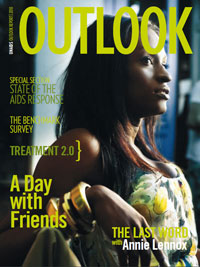
Ahead of the XVIII International AIDS Conference to be held in Vienna from 18 – 23 July, UNAIDS has launched its OUTLOOK Report 2010 in Geneva.
Key findings:
The new UNAIDS Outlook report outlines a radically simplified HIV treatment platform called Treatment 2.0 that could decrease the number of AIDS-related deaths drastically and could also greatly reduce the number of new HIV infections. Evidence shows that new HIV infections among young people, in the 15 countries most affected by HIV, are dropping significantly as young people embrace safer sexual behaviours.
Also in the report, a sweeping new UNAIDS and Zogby International public opinion poll shows that nearly 30 years into the AIDS epidemic, region by region, countries continue to rank AIDS high on the list of the most important issues facing the world.
And an economic analysis makes the case for making health a necessity, not a luxury, outlining the critical need for donor countries to sustain AIDS investments and calling on richer developing countries to invest more in HIV and health.
Read press release
Download full report (pdf, 6MB)
Visit the OUTLOOK micro site
SUPPLEMENTS:

Treatment 2.0 - Is this the future of treatment?
PDF | 197 Kb

Young people are leading the HIV prevention revolution
PDF | 1.34MB

Making sense of the money + Where does the money for AIDS go?
PDF | 389 Kb

The Benchmark - What the world thinks about the AIDS response
PDF | 1.54MB | 412 Kb
Download summary
Download full report
OUTLOOK micro site:
Visit the UNAIDS OUTLOOK special site to access additional materials
Right Hand Content
Press centre:
Publications:
UNAIDS OUTLOOK report 2010
Treatment 2.0 - Is this the future of treatment?
Young people are leading the HIV prevention revolution
Making sense of the money + Where does the money for AIDS go?
The Benchmark (summary)
The Benchmark - What the world thinks about the AIDS response (full report)
UNAIDS vision and mission
Related

Feature Story
Research project during the World Cup gathers data on sex workers and HIV
12 July 2010
12 July 2010 12 July 2010 The research was supported by a telephone helpline service to respond to health and human rights concerns of sex workers during the World Cup.
The research was supported by a telephone helpline service to respond to health and human rights concerns of sex workers during the World Cup. Credit: UNFPA
As part of the UN South Africa Programme of Support to the FIFA 2010 World Cup, UNFPA and SWEAT (Sex Worker Education & Advocacy Taskforce) partnered with South African researchers to investigate key dimensions of HIV and sex work during the tournament. This rigorous research was supported by a telephone helpline service to respond to health and human rights concerns of sex workers during the World Cup. According to Mr. Eric Harper, Executive Director of SWEAT: “These projects give weight to the rights watch dimension for most-at-risk-populations that is so vital when the largest sporting event in the world occurs.”
Sex work in South Africa became one of the most talked about issues in preparation for the tournament. Newspapers warned of an influx of sex workers to the country to exploit the lucrative potential of the arrival of thousands of soccer fans. As the programme’s lead researcher, Marlise Richter, maintained: “Public health and human rights responses to international sporting events should be based on rigorous, systematic research - not on fear-mongering and sensationalism.” This referred to media reports that over-estimated the number of foreign sex workers headed to the country and the result of confusing issues of trafficking and sex work. The research also addresses the significant data shortages related to sex work and HIV in South Africa in the longer term.
The research assessed sex worker fears, expectations and experiences of the World Cup, gathered information on sex worker mobility, frequency of health care visits and interaction with police. It also tracked the number of clients and potential changes in sex work activity during the World Cup. The tournament presented a strategic opportunity for South Africa to respond to the challenges that the sex industry poses in a rights-based way and provided the momentum for these issues to be taken further in the future. At the same time, conducting research that tracked the changes in the sex work sector during a big, international sporting event is vital to inform future policy and planning for similar events across the world.
Following a right-to-health approach, and in accordance with the UNAIDS Guidance Note on HIV and Sex Work , UNFPA supported SWEAT to provide sexual and reproductive health services, including HIV prevention, to sex workers during the tournament and beyond. Sex workers’ ability to look after their health, more especially their sexual and reproductive health, is inextricably linked to their ability to access human rights in general.
Commenting on the initiative, Dianne Massawe, Project Officer for SWEAT said: “This partnersunhip affords us the opportunity to respond specifically to the sexual and reproductive health aspect through increased outreach and distribution of safer sex tools and information to sex workers. In addition, the telephone helpline provide[d] valuable assistance to sex workers around the human rights abuses they face.”
South Africa is often referred to as the epicentre of the AIDS epidemic, home to the world’s largest number of people living with HIV. Within this epicentre, populations most at risk of HIV infection must be prioritised in prevention strategies. UNFPA supports SWEAT in research that will generate further evidence on the need for comprehensive programmes that promote a human rights-based approach to universal access to HIV prevention, treatment, care and support in the context of adult sex work.
The completed research report is expected by September 2010.
Right Hand Content
Cosponsors:
United Nations Population Fund (UNFPA)
Partners:
Sex Worker Education & Advocacy (SWEAT)
Feature stories:
Swing and Sisters: HIV outreach to sex workers in Thailand (19 March 2009)
Contact:
UNFPA South Africa: Gerit Maritz
maritz@unfpa.org
+27 12 354 8401
Publications:
Related

Feature Story
AIDSspace @ Vienna 2010
12 July 2010
12 July 2010 12 July 2010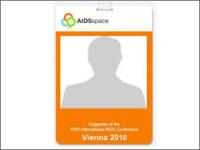
Ahead of the XVIII International AIDS Conference in Vienna, AIDSspace.org has created a group to provide a forum for AIDSspace members to share information and updates on events during the six day conference. Members can start discussions as well as send a promotional e-postcard to spread the word.
Members who join the group are provided with a specially-designed AIDSspace badge to show support for the conference.
In addition to forums, the group page provides links to key conference resources, such as the official conference programme, webcasting, and the daily bulletin. An interactive calendar offers an overview of the key sessions, satellites and other events happening throughout the week.
During the conference, the group will be updated daily with news from Vienna.
AIDSspace.org was launched in November 2009 as an online network for the 33.4 million people living with HIV and the millions engaged in the AIDS response.
Right Hand Content


AIDSspace @ Vienna group
AIDSspace sign-up page
Feature stories:
AIDSspace.org: Supporting the global AIDS response through social networking (18 December 2009)
Related

Feature Story
UNICEF and partners help make the World Cup a win for children
09 July 2010
09 July 2010 09 July 2010A version of this story was first published at unicef.org
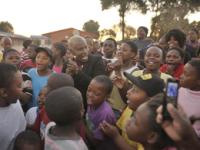 UNICEF Goodwill Ambassador Angélique Kidjo dances with children at a 'safe park' in Soweto, on the outskirts of Johannesburg.
UNICEF Goodwill Ambassador Angélique Kidjo dances with children at a 'safe park' in Soweto, on the outskirts of Johannesburg.Credit: © UNICEF/NYHQ2010-1150/Hearfield
UNICEF has been using the 2010 FIFA World Cup to help harness the power of sport to promote children’s rights. A series of partnerships and programmes around the global football championship are providing children with the opportunity to learn about their world and be better protected.
A special partnership between UNICEF and the South African government addresses potential problems that may arise due to the increased presence of people. In a country where an estimated 12 million children live in poverty, special attention is being given to unaccompanied minors, some of whom may be induced to travel to the cities where games are played in search of employment opportunities and adventure.
A massive communication campaign was launched that sends out a message that child abuse and exploitation have no place in South Africa. Targeted at children, parents and tourists, the campaign uses digital, print and electronic outreach to warn about child abuse, exploitation, child sex tourism and trafficking. Partners, including hotels, car rental companies and tour operators are also disseminating messages about child rights and safety throughout their networks.
Child-friendly spaces, supported by UNICEF and partners, have been open at four of the major FIFA Fan Fests in Soweto, Sandton, Nelspruit and Port Elizabeth. The sites have played to host to 15,000 to 45,000 fans as well as social workers, child and youth care workers and trained volunteers charged with identifying children who are in need of protection and emergency care. TV screens showed matches in the spaces and age-appropriate activities were offered as well.
UNICEF also harnessed the influence of international stars visiting the country for the tournament, such as UNICEF Goodwill Ambassador Angelique Kidjo, to highlight the immense needs of South African children made vulnerable by poverty and HIV.
Outside South Africa, a pilot programme called “World Cup in my village” has given young people in three locations in Rwanda and Zambia the opportunity to view matches on large open-air screens and projectors. In addition to the football, the screens are broadcasting important information about children’s health and their rights.
According to Anthony Lake, UNICEF Executive Director from New York: “The World Cup gives us a chance to focus positive public attention on the special risks children face in countries like South Africa and around the world and the special efforts we can take to protect them from those threats.”
Right Hand Content
Cosponsors:
Partners:
Unite for Children, Unite against AIDS
Feature stories:
UNAIDS launches ‘red card’ campaign against HIV (12 June 2010)
FIFA World Cup 2010 festivities begin in South Africa, Angélique Kidjo visits Soweto (10 June 2010)
Safe sex during the 2010 World Cup (08 June 2010)
Ahead of World Cup, national team captains appeal: “Give AIDS the red card” (07 June 2010)
Danny Jordaan and UNAIDS Executive Director discuss global AIDS outreach around FIFA 2010 World Cup in South Africa (04 December 2009)
External links:
2010 FIFA World Cup South Africa
Publications:
Children and AIDS, Fourth Stocktaking Report, 2009
Children and AIDS, Fourth Stocktaking Report, 2009: Summary
The State of the World’s Children
Related

Feature Story
Egyptian actor Amr Waked appointed UNAIDS Goodwill Ambassador for Middle East and North Africa
08 July 2010
08 July 2010 08 July 2010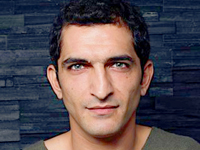
Renowned Egyptian actor Amr Waked has been named Regional Goodwill Ambassador for the Joint United Nations Programme on HIV/AIDS (UNAIDS) in the Middle East and North Africa (MENA). A popular star, Mr Waked is an influential figure with teenagers as well as adults across the region. Now, he joins UNAIDS' commitment to speaking out against stigma and discrimination of people living with or affected by HIV.
"I will work with all partners, including the media, to raise awareness about the disease, reduce stigma, discrimination and fear, and deliver correct messages to people who don’t know about AIDS and who keep judging others without knowing about their lives and circumstances,” said Mr Waked.
“People living with HIV have to get the support they need. It is not the disease that kills you; it is the people around you who refuse to understand and help you, who kill you,” he added.
In his capacity as Regional Goodwill Ambassador Mr Waked will help raise awareness on issues related to HIV and give greater voice to the needs of people living with HIV in the Middle East and North Africa. He will also address issues of stigma and discrimination faced by people living with HIV and key populations at increased risk of infection and advocate for rights of people living with HIV and young people.
Mr Waked has taken part in the “Unite for Children, Unite Against AIDS” campaign with UNICEF. He also contributed to the production of two docudramas on HIV as well as participating in UNICEF’s SOTNA (“Our voice”) programme with young people, and he also mainstreamed HIV and Hepatitis C prevention messages into the TV series "lahazat harega" (Emergency situations).
Speaking of Mr Waked's appointment, Dr Hind Khatib, Regional Director, UNAIDS MENA Regional Support Team, said, “Amr has chosen to be the voice of the voiceless. He has been interested in this field for a long time and has contributed to the production of a documentary that reflects the stigma and discrimination faced by people living with HIV in the Middle East and North Africa. We count on him to work with us in advancing the AIDS agenda in the region.”
Mr Waked will start his work next week in the city of Dubai where representatives from the Region will convene to discuss where MENA is in its efforts to scale up universal access to HIV prevention, treatment, care and support.

